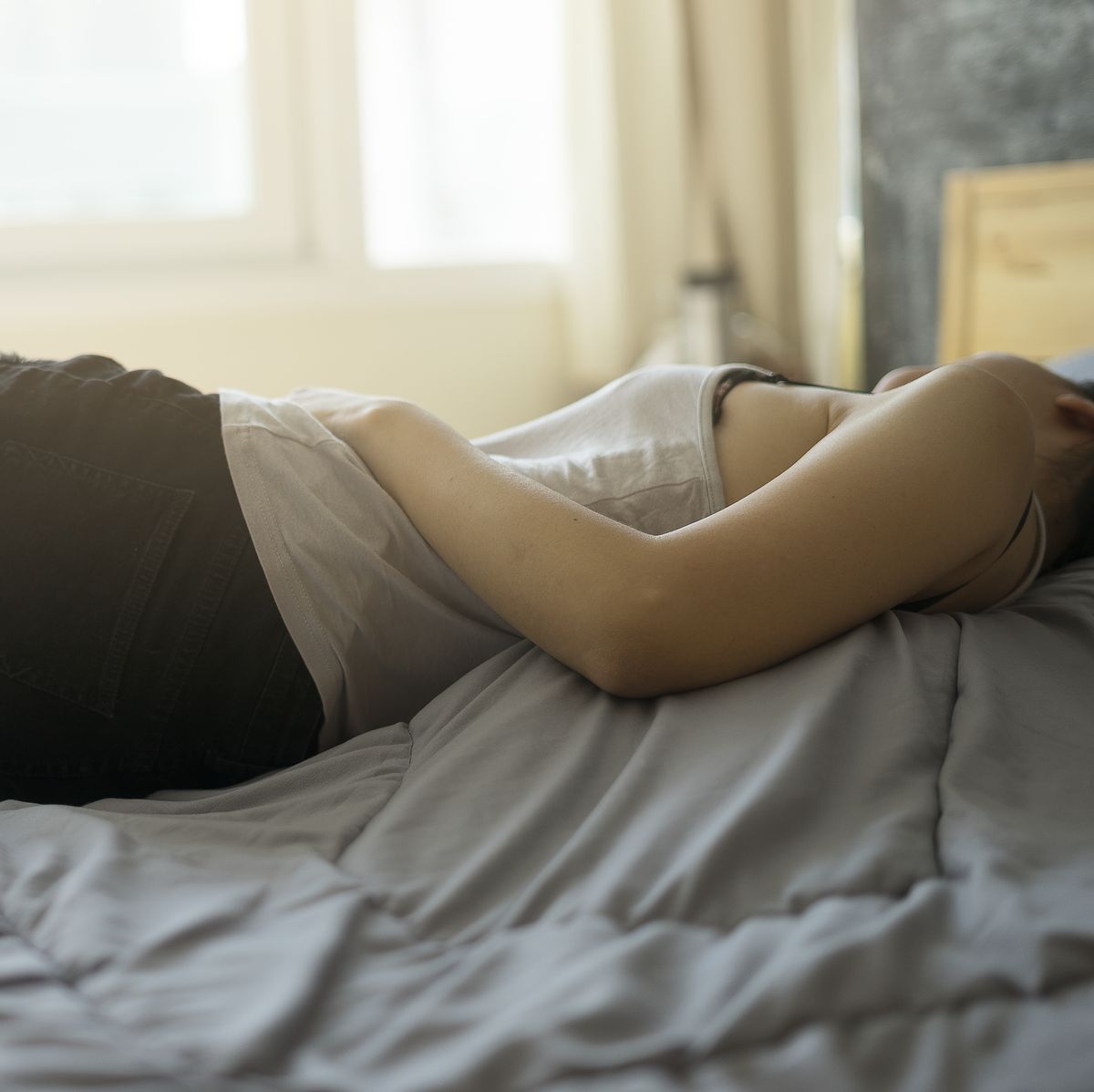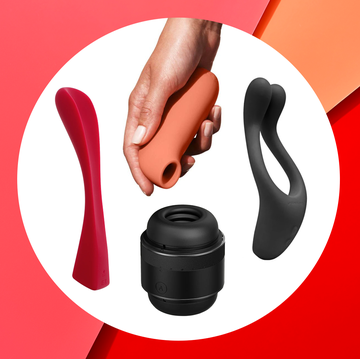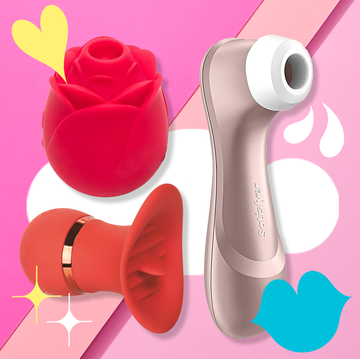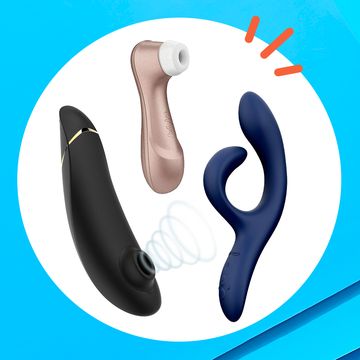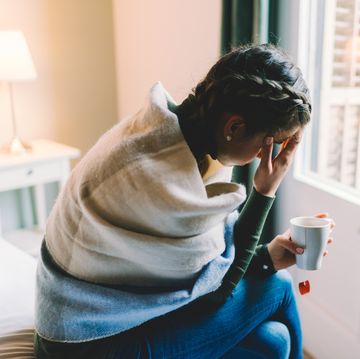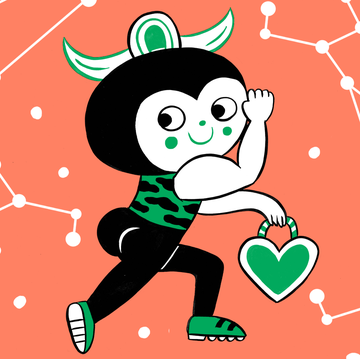Sex is supposed to feel amazing. But let's be real, for many reasons, that is not always the case. And one spot you may be feeling discomfort after doing the deed is in your stomach. (Yep, it's totally normal.) If that's you, you may be wondering why your stomach hurts after sex—and how to make it stop, like, yesterday.
Obviously, any kind of stomach discomfort sucks, but it feels especially unfair when you're doubled over in pain after something that's supposed to be, well, pleasurable. And it's not an uncommon experience, either, says Amy Roskin, MD, JD, a board-certified ob-gyn and chief medical officer at The Pill Club.
Experiencing some stomach pain can be the result of a few things, including deep penetration during intercourse, which can trigger the vasovagal nerve, which links the brain, heart, and digestive system, as a result of contact with the cervix, notes Roskin.
"Typically, muscles will involuntarily contract in the pelvis and pelvic floor after orgasm, causing a cramping feeling after sex," says James A. Gohar, MD, ob-gyn and CEO at Viva Eve, a women’s health and fibroids practice in New York City.
While this type of pain is usually treatable, often taking a non-steroidal anti-inflammatory drug like ibuprofen can help ease symptoms, notes Roskin. "If you’re consistently experiencing stomach pain after sex, seek out the advice of a licensed medical professional," she adds. "And if you’re unable to access a doctor in your area, telehealth services can make the process of consulting a medical professional about your symptoms simple and stress-free."
Ahead, 13 possible reasons your doc might offer up to explain why your stomach's hurting after sex.
Meet the experts:
Amy Roskin, MD, JD is a board-certified ob-gyn and the chief medical officer at The Pill Club.
James A. Gohar, MD is an ob-gyn and CEO at Viva Eve, a women’s health and fibroids practice in New York City.
Mary Jane Minkin, MD is an ob-gyn at Yale New Haven Hospital.
Ja Hyun Shin, MD is the director of the pelvic pain clinic in the department of Women’s Health and Obstetrics & Gynecology at Montefiore Health System.
Jill Purdie, MD is a board-certified ob-gyn and medical director at Pediatrix Medical Group.
Laura Purdy, MD, is a board-certified family medicine physician in Franklin, Tennessee.
1. You can blame your sex position.
When patients see Mary Jane Minkin, MD, an OB-GYN at Yale New Haven Hospital, about pain after sex, she first asks them what position they do most. If you always have pain after missionary or doggy style, it could be because of the deep penetration.
What to do: First try over-the-counter pain medications, like Motrin or Tylenol. "Taking one or two an hour before sex can be very helpful for some women," says Minkin. She also recommends trying a position where you're on top and in control, such as cowgirl or face-off.
The key is choosing a position where you have more control over the depth and frequency of penetration, explains Ja Hyun Shin, MD, director of the pelvic pain clinic in the department of Women’s Health and Obstetrics & Gynecology at Montefiore Health System. She also suggests trying a sideways position, like spooning, that allows for more shallow penetration.
2. You're experiencing vaginal dryness.
Certain birth control pills (and other medications, too) can cause vaginal dryness. A higher dose of estrogen can be helpful here, says Minkin. And if you're heading toward menopause, you can probably blame that for the ouch.
What to do: Grab some lube. If that doesn't work, ask your doctor about prescription options. Minkin says vaginal estrogen and/or vaginal DHEA (the hormone dehydroepiandrosterone) medication can do the trick.
3. You have an ovarian or pelvic cyst.
Many women have ovarian cysts—fluid-filled sacs or pockets in an ovary or on its surface—at one time or another, though they most commonly appear after menopause. Most are harmless and disappear without treatment after a few months, but some can continue to grow and cause pain.
Pelvic cysts are a bit different. A pelvic cyst can develop from scar tissue from previous surgeries or possibly an infection where fluid collects in the pelvic area, says Shin. "Think of the whole pelvis and vagina area as one unit," when it comes to pain, she says, since pain in one place will likely affect another. "Sex can cause pain in other areas of the pelvis."
What to do: Your doctor will do an ultrasound to diagnose the problem, then you might need a laparoscopy to remove the cysts.
4. You're on your period.
"Although menstrual cramps and pain might be ameliorated during sex, afterward, these symptoms can return as a result of contracting uterine muscles and pressure on the cervix during sex," says Roskin.
What to do: You have a few options: taking ibuprofen before sex or applying a heating pad afterward can help to alleviate menstrual cramping during and afterward, as can avoiding sexual intercourse if your cramps are feeling particularly intense on a given day.
Mixing up your sex positions can sometimes do the trick if sex is painful. Check these out:
5. You have an infection or a past inflammatory disease.
A vaginal infection from bacteria normally found in your vagina or from a sexually transmitted disease, such as chlamydia or gonorrhea, can spread from your vagina to your uterus, fallopian tubes, or ovaries (a.k.a. pelvic inflammatory disease). As if an infection weren't bad enough, it tends to give you vaginal pain and pelvis pain. This pain is pretty much constant, Shin says, but sex can worsen it because you're irritating an already irritated area.
And get this—you don't even need to have a current vaginal infection to have this kind of pain. According to Minkin, a previous pelvic inflammatory disease can cause post-sex pelvis pain if it left pelvic scarring.
What to do: If it's an infection, you just need a round of prescription antibiotics. But if it's a previous pelvic inflammatory disease, your OB-GYN may need to prescribe pain medications or cut down the adhesions (during a laparoscopy, for example).
6. It's actually anxiety or unease.
"Pain after sex might come from emotional distress rather than a physical cause," says Roskin. "Sometimes prior sexual trauma can cause feelings of discomfort or pain during or after sex."
What to do: For help in addressing these feelings or stressors associated with sex, Roskin suggests you seek out a licensed mental health professional, who can offer you the guidance you need.
7. You have fibroids.
Between 20-70 percent of women will get fibroids while they're capable of reproduction. While fibroids are benign (non-cancerous) tumors of the uterus, they "may cause pain during intercourse depending on their size and location in the uterus," says Shin. They can also cause muscle cramping, which may explain why you're having pelvic pain after sex.
What to do: See your doc for an ultrasound or an MRI of the pelvis, then discuss treatment options from there. They range from an IUD to a hysterectomy.
8. You might have endometriosis.
Endometriosis happens "when the lining of the uterus (womb) grows outside of the uterus," according to the Office on Women's Health. Pelvic pain during and after sex is one of the most common symptoms of the condition, Shin says. Endometriosis affects between 2-10 percent of women and it usually takes between 6 and 10 years to be diagnosed.
When you have a severe form of endometriosis of the pelvis, you can have dense adhesions (translation: pelvic tissues and organs sticking to each other) in the pelvic area. So the pressure put on them during deep penetration can be pretty painful, she explains. But you can also have pain without these adhesions since endometriosis causes pain from inflammation.
What to do: Go to your gyno. Even though you're having stomach pain, your doc will probably ask you about your overall history of vaginal pain. Do you have pain with your periods? Do you bleed heavily?
They may then suggest an ultrasound or laparoscopy, a minor surgery to examine your pelvis. That's the only way, Shin says, to diagnose endometriosis for sure. To treat it, your doc will likely prescribe you birth control pills or endometriosis medications.
9. You have a tilted uterus.
Don't freak out. "At least 30 percent of women have a uterus that tilts backwards, so it's not abnormal," says Minkin. But if your uterus became tilted as the result of scar tissue from infection or endometriosis, "well, then that would be painful."
But if it's not abnormal, then why the heck does a tilted uterus cause stomach pain? Minkin explains that doctors don't really know, but they think it's because the scarring attaches organs to other organs—ones that, uh, shouldn't be attached—and they can get hit during sex. And if your intestines are attached to your uterus by scar tissue, they can get pushed or pulled during sex. And that's pretty painful.
What to do: Your doctor will tell you if your uterus is just naturally tilted, or if it could be the result of scarring. If there's no scarring, try a sex position with more shallow penetration. If it's scarring, it's likely due to endometriosis and your doctor will investigate and determine the best treatment for you.
10. You may have chlamydia.
One of the symptoms of chlamydia, a sexually transmitted disease, is lower abdominal pain and painful intercourse.
What to do: "Chlamydia is often tested during routine annual pap smears, so it's important to schedule these appointments yearly," says Gohar. "If you suspect you may have contracted chlamydia, you should contact an OB-GYN immediately to be tested and start a proper course of treatment. Chlamydia can be treated with a course of antibiotics."
Always use protection during intercourse to protect yourself from possible sexually transmitted diseases.
11. You might have uterine prolapse.
Your pelvic floor does *a lot* to keep everything where it should be. If prolapse occurs, the pelvic floor and its ligaments are stretched and can no longer support the uterus. This could cause the uterus to move into the vaginal canal.
"During intercourse, the penis may come in contact with the uterus, which can cause stomach pain for two reasons," says Jill Purdie, MD, a board-certified ob-gyn and medical director at Pediatrix Medical Group. "First, it may cause the uterus to cramp due to the contact. Second, intercourse may move the uterus up and down, which will often cause a dull, achy pain after sex."
What to do: If prolapse doesn't interfere with your comfort and day-to-day activities, you may not have to treat it. However, you may opt for practicing Kegels or using a vaginal pessary, which is a silicone tool inserted to support any bulging tissues, according to the Mayo Clinic.
"Often pelvic floor physical therapy will be very helpful to retrain and strengthen the pelvic floor," says Purdie. "In cases of prolapse, some women may need surgical intervention to reposition the pelvic organ back into its correct location."
12. You're experiencing gas and constipation.
While gas and constipation tend to be less severe, they can still bring some discomfort after sex. "When you're constipated, your bowel puts pressure on your vagina," says Laura Purdy, MD, a board-certified family medicine physician. All the movement that comes with penetration is also felt in the rectum, which can lead to cramping and abdominal pain, she adds.
What to do: The main thing to look out for is your diet. Purdy suggests opting for foods that are high in fiber and steering clear of foods that tend to make you gassy.
13. You have a UTI.
Urinary tract infections (UTIs) don't feel great to begin with, but they can leave you feeling even more uncomfortable after sex. "Pelvic inflammatory disease (PID) and UTIs are the most common of these infections," says Purdy.
What to do: A UTI usually means a trip to the doctor is in order. From there, your provider will prescribe you medication. Additionally, you may be recommended to drink plenty of water and avoid alcohol, according to the Mayo Clinic.
When in doubt, talk to your doctor.
Anytime you have pain in the pelvic area, it's recommended to talk to your gynecologist. "It's an important time to go in and [get an] exam because there are a variety of serious conditions that, if left undiagnosed, can lead to more pain in the future," says Shin.
There are also a few specific symptoms to look out for, according to Purdie. This includes:
- Stomach pain every time or almost every time you have sex
- Bleeding after sex that's not related to your period
- Having foul-smelling or unusual discharge for more than two days
- Having pain along with fever, chills, nausea, or vomiting
"If your pain persists for more than one to two days after intercourse or is not relieved with over-the-counter pain medications such as ibuprofen or acetaminophen," you should consider giving your doctor a call, says Purdie. Still uncertain? "Any time you are concerned, it is never wrong to call or visit your doctor."
Noted, doc.

Lindsay Geller is the Lifestyle Director at Women’s Health, where she oversees the Life, Sex & Love, and Relationships sections on WomensHealthMag.com and the Mind section of Women's Health magazine. When she's not writing or editing articles about the latest dating trends and pop culture phenomenons, she's usually watching reality TV or playing with her dog, Lucille (Go Fetch That) Ball.
Emily Shiffer is a former digital web producer for Men’s Health and Prevention, and is currently a freelancer writer specializing in health, weight loss, and fitness. She is currently based in Pennsylvania and loves all things antiques, cilantro, and American history.
Sabrina is an editorial assistant for Women’s Health. When she’s not writing, you can find her running, training in mixed martial arts, or reading.
